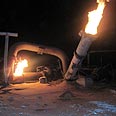
Attack on Egyptian pipeline
צילום: EPA
Electricity rates to soar 30%
Repeated attacks on Egyptian pipeline lead Electricity Authority to conclusion that gas supply will not be resumed in 2012, at least not regularly. IEC must resort to more expensive fuels; tariffs expected to climb as soon as February
Domestic and industrial electricity rates are expected to leap 30% early next year, Calcalist has learned. The information was presented at an ad hoc meeting between Ministry of Finance, Ministry of National Infrastructures and Electricity Authority representatives.
Calcalist has also learned that the sharp tariff climb – following the 15% hike last August – is driven predominantly by the cutoff in Egyptian gas as of last week.
The Electricity Authority's estimations presented at the meeting were based on the assumption that the Egyptian gas supply would be either irregular or completely cut off during 2012, leaving Israel with a single gas supply – the Yam Tethys gas license.
However, the field is depleting and the Ministry of National Infrastructures has limited its supply. Consequently, the Israel Electric Corporation will have to power its stations with the more expensive gasoil or fuel oil. The Electricity Authority estimates that this will contribute some two thirds of the rate hike next year.
Diesel fuel costs more
The Authority attributes some 5.5% of the hike to fuel price differences during 2011, after the IEC was forced to procure more expensive fuel in order to power its stations following several disruptions in the gas supply from Egypt during the year.
The IEC will compensate for the price differences retroactively in the 2012 tariffs. According to the company's 2010 reports, the production of one kilowatt hour of electricity using gas cost 13.4 agorot (about 3.6 cents), whereas the production of the same volume using diesel fuel cost NIS 1.43 (39 cents).
Furthermore, the Authority estimates that 3%-4% of the hike will stem from operating tariff updates and costs of solar energy. The IEC is obligated to purchase all the solar energy produced in Israel for the next 20 years.
Since the cost of solar energy production is triple the tariff paid by private consumers, increases in production quotas are subsidized through the general electricity tariff.
Solutions are at hand
The discussion on the tariff hike was scheduled for next April; however, in light of the gloomy forecasts from the meeting two days ago, the inclination is to hold the meeting as soon as February.
The IEC explains that the rate hike can be reduce by the following steps: first, the annulment of the general order issued by the Ministry of Environmental Affairs allowing unrestricted use of fuel oil, which is considerably cheaper than gasoil which when used to produce electricity in 2010, cost 47.9 agorot (12.9 cents) per kilowatt hour.
Second, the extension of the order to lower taxes on gasoil to 69%, signed last summer following the IEC's announcement of its poor financial situation.
The order expires at the end of this year and voices at the Ministry of Finance and the Knesset are calling for its extension until the end of 2012.Third, placing a demand to the Egyptians to reinstate the gas supply.
The Electricity Authority says the reinstatement of the Egyptian gas at a minimal 30% of quota originally agreed on will keep the tariff hike down to 15%-20%.
Click here to read this report in Hebrew










